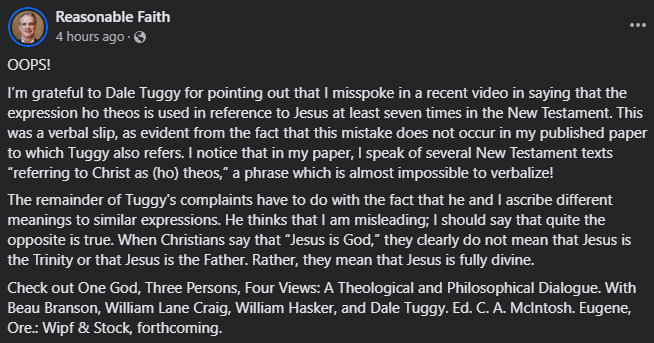|
Listen to this post:
|
On July 10, 2024, Dr. Craig was gracious enough to accept this correction about the number of occurrences of ho theos in the New Testament.

And yes, it is true, he does not make this mistake in the forthcoming debate book.
Perhaps there is a further agreement here?
I notice that in my paper, I speak of several New Testament texts “referring to Christ as (ho) theos,” a phrase which is almost impossible to verbalize!

Dr. Craig’s theology needs New Testament talk of Jesus being theos to mean that Jesus is “a divine Person” somehow “in” the one God, who is not himself a god. But as best I can tell, that is not a New-Testament-era usage of theos or ho theos. Maybe that’s his point – that what he thinks these texts must mean can’t be, or can’t easily be expressed in New-Testament-era koine Greek? If so, I agree! But then, this should count against the biblical credentials of his theology. What he’s saying can’t, then, be what they meant.
The standard scholarly New Testament Greek lexicon says that “Some writings . . . use the word theos with reference to Christ (without necessarily equating Christ with the Father,” but I take it this is just a special case of their fourth listed meaning, for “that which is transcendent but considered worthy of special reverence,” such as various humans (e.g. John 10:34f). (BDAG 4th ed. pp. 398-400) Of course the overwhelming usage of theos in the New Testament is for the Father. “God” nearly always refers to one believed to be a (and the only) god (sensibly enough), the one they used to call “Yahweh.” As evangelical New Testament scholar Dr. Murray Harris writes,
When (ho) theos [i.e. either theos or ho theos] is used, we are to assume that the NT writers have ho pater [the Father] in mind unless the context makes this sense of (ho) theos impossible.
Harris, Jesus as God: The New Testament Use of Theos in Reference to Jesus, p. 47.
And mustn’t we think this reflects their assumption that the Father and the one god are one and the same? In the debate book I argue on the basis of twenty classes of facts which all point in this direction.
Missing in action, in the New Testament, are these meanings for theos:
- the Trinity
- a “divine Person” somehow “in” the one true God (who is not himself a god)
These are not New Testament-era uses of theos or ho theos. But if you look up theos in a patristic Greek lexicon, you will find these uses, as they’re needed by the fully-developed 4th c. Nicene orthodoxy – ideas which were genuinely new in that era.
Finally, a brief comment on this:
When Christians say that “Jesus is God,” they clearly do not mean that Jesus is the Trinity or that Jesus is the Father. Rather, they mean that Jesus is fully divine.
It is a false assumption of catholic apologists that officially trinitarian Christians mean some one thing in their Trinity-talk. For decades now Craig has been insisting that what he says above, a predication of divinity, should be what Christians mean by saying “Jesus is God.” And contra tradition, being “divine” here doesn’t mean having the divine essence, as traditionally understood. In Craig’s view only the Trinity is “divine” in the sense which entails being a god. So “fully” above is misleading; it does not mean, in Craig’s view, having all the divine attributes (see his co-authored book Philosophical Foundations on that, p. 590), and it does not, in Craig’s view, entail being a god. But alas, there is far more disagreement in the vast Trinity-camp than Dr. Craig wants to admit to.

- Some even educated Christians think that “Jesus is God” identifies Jesus with God. Some of these defend “the doctrine of the Trinity” as a merely apparent or even a real contradiction.
- Even among those who don’t defend (apparent) contradictions, it’s common for semi-educated Christians to look at the old Trinity shield and think that trinitarian theology entails that Jesus is God (i.e. Jesus = God) but also the Father is God (i.e. the Father = God). And I daresay that every long-term evangelical has heard someone in church pray like this: “Oh Father, we thank you for this day . . . we thank you for dying for us on the cross. In your [i.e. Jesus’] name we pray, Amen.” Such folks are correctly inferring from j = g and f = g, that j = f. But that last is a Christological disaster.
- Others, whether or not they think the above, hold that Jesus is a god, of course, the only god, and the same god as the Father, such as learned relative identity theorists.
- Others, use “Jesus” as the proper name of the Christian god as opposed to other alleged deities, and we hear talk of Jesus instead of Allah, or Jesus among the (alleged) gods.
- Others, not realizing that they have a consistency problem, hold that the one God and the Trinity are one and the same. (Just ask them: Is the one true God the triune God?) And they also think that Jesus and God are one and the same. As any analytic philosopher is aware, this entails that Jesus and the Trinity are one and the same (numerically identical). But, most believers are not analytic philosophers.
- Others will gladly affirm that “Jesus is God” means that Jesus is a part of God. Others strongly deny it, e.g. proponents of divine simplicity.
- Others will gladly agree that Jesus is something like a personality of the one God. Others strongly deny it, e.g. “social” trinitarians.
- We could go on; “the doctrine of the Trinity” has been a sort of playground for metaphysicians recently, and historically.
In sum, catholic Trinity theorizing is a confused and confusing mess. I sincerely wish Dr. Craig were right to insist that mainstream Christians mean some one thing when they say “Jesus is God.” But as it stands, Trinity-formulas and deity-of-Christ statements were enforced by the Church without a clear consensus on their meanings; this goes right back to the innovations of Nicea. These sentences were elevated as expressing “mysteries” beyond our comprehension, so that pointing out all the confusions is considered to be point-missing. For a philosopher, this is a depressing fact. But it’s one we must face up to. Confusion, and so, avoidance, are the status quo.

Maybe he can show me one reference to Jesus using ho on – as in ??? ???? ? ??
Comments are closed.